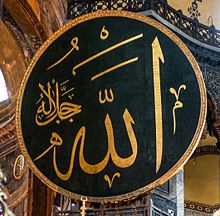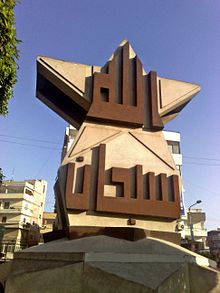Allah

Allah (Arabic: ٱللَّٰه, Allāh, IPA: [ʔalˤːɑːh]) is the standard Arabic name for God (illah) or precisely "The God" (Al-illah), used by Arabic-speakers of all Abrahamic faiths, including Muslims, Christians and Jews. The term is derived from a contraction of the Arabic article al- and ʾilāh "god, deity" to al-lāh, meaning "of (al) none or nothing (lah) deity, God" (ho theos monos); another theory traces the etymology of the word to the Aramaic Alāhā. It is linguistically related to the Hebrew word El (Elohim). The term was also used by polytheistic Meccans as a reference to the creator-god, possibly the supreme deity in pre-Islamic Arabia.
| This Islam-related article is a stub. You can help out with Wikiquote by expanding it! |
Quotes
[edit]Quran
[edit]
- بِسْمِ ٱللَّهِ ٱلرَّحْمَـٰنِ ٱلرَّحِيمِ
ٱلْحَمْدُ لِلَّهِ رَبِّ ٱلْعَـٰلَمِينَ
ٱلرَّحْمَـٰنِ ٱلرَّحِيمِ
مَـٰلِكِ يَوْمِ ٱلدِّينِ
إِيَّاكَ نَعْبُدُ وَإِيَّاكَ نَسْتَعِينُ
ٱهْدِنَا ٱلصِّرَٰطَ ٱلْمُسْتَقِيمَ
صِرَٰطَ ٱلَّذِينَ أَنْعَمْتَ عَلَيْهِمْ غَيْرِ ٱلْمَغْضُوبِ عَلَيْهِمْ وَلَا ٱلضَّآلِّينَ- Quran 1:1–7
- Translations:
- In the Name of Allah—the Most Compassionate, Most Merciful.
All praise is for Allah—Lord of all worlds,
the Most Compassionate, Most Merciful,
Master of the Day of Judgment.
You ˹alone˺ we worship and You ˹alone˺ we ask for help.
Guide us along the Straight Path,
the Path of those You have blessed—not those You are displeased with, or those who are astray. - In the name of Allah, Most Gracious, Most Merciful.
Praise be to Allah, the Cherisher and Sustainer of the worlds;
Most Gracious, Most Merciful;
Master of the Day of Judgment.
Thee do we worship, and Thine aid we seek.
Show us the straight way,
The way of those on whom Thou hast bestowed Thy Grace, those whose (portion) is not wrath, and who go not astray.
- In the Name of Allah—the Most Compassionate, Most Merciful.
- The opening of the Quran (Surah al-Fatiha). In Arabic, the opening words (1:1)[1] read: Bismillah ar-Rahman ar-Rahim (بِسْمِ ٱللَّهِ ٱلرَّحْمَـٰنِ ٱلرَّحِيمِ, stylized as ﷽), and are often referred to as "the Bismillah".[2] They open every chapter of the Quran, with the exception of chapter 9. The second verse (1:2) contains the phrase alhamdulillah (ٱلْحَمْدُ لِلَّهِ, "praise be to God").

- ٱللَّهُ لَآ إِلَـٰهَ إِلَّا هُوَ ٱلْحَىُّ ٱلْقَيُّومُ ۚ لَا تَأْخُذُهُۥ سِنَةٌۭ وَلَا نَوْمٌۭ ۚ لَّهُۥ مَا فِى ٱلسَّمَـٰوَٰتِ وَمَا فِى ٱلْأَرْضِ ۗ مَن ذَا ٱلَّذِى يَشْفَعُ عِندَهُۥٓ إِلَّا بِإِذْنِهِۦ ۚ يَعْلَمُ مَا بَيْنَ أَيْدِيهِمْ وَمَا خَلْفَهُمْ ۖ وَلَا يُحِيطُونَ بِشَىْءٍۢ مِّنْ عِلْمِهِۦٓ إِلَّا بِمَا شَآءَ ۚ وَسِعَ كُرْسِيُّهُ ٱلسَّمَـٰوَٰتِ وَٱلْأَرْضَ ۖ وَلَا يَـُٔودُهُۥ حِفْظُهُمَا ۚ وَهُوَ ٱلْعَلِىُّ ٱلْعَظِيمُ
- Quran 2:255
- Translations:
- Allah! There is no god ˹worthy of worship˺ except Him, the Ever-Living, All-Sustaining. Neither drowsiness nor sleep overtakes Him. To Him belongs whatever is in the heavens and whatever is on the earth. Who could possibly intercede with Him without His permission? He ˹fully˺ knows what is ahead of them and what is behind them, but no one can grasp any of His knowledge—except what He wills ˹to reveal˺. His Seat encompasses the heavens and the earth, and the preservation of both does not tire Him. For He is the Most High, the Greatest.
- This famous passage is known as the Throne Verse.

- وَمَكَرُوا۟ وَمَكَرَ ٱللَّهُ وَٱللَّهُ خَيْرُ ٱلْمَـٰكِرِينَ
- Quran 3:54
- Translations:
- And the disbelievers made a plan ˹against Jesus˺, but Allah also planned—and Allah is the best of planners.
- And they planned whilst God planned too, and the best of the planners is God.[citation needed]

- وَإِن نَّكَثُوٓا۟ أَيْمَـٰنَهُم مِّنۢ بَعْدِ عَهْدِهِمْ وَطَعَنُوا۟ فِى دِينِكُمْ فَقَـٰتِلُوٓا۟ أَئِمَّةَ ٱلْكُفْرِ ۙ إِنَّهُمْ لَآ أَيْمَـٰنَ لَهُمْ لَعَلَّهُمْ يَنتَهُونَ أَلَا تُقَـٰتِلُونَ قَوْمًۭا نَّكَثُوٓا۟ أَيْمَـٰنَهُمْ وَهَمُّوا۟ بِإِخْرَاجِ ٱلرَّسُولِ وَهُم بَدَءُوكُمْ أَوَّلَ مَرَّةٍ ۚ أَتَخْشَوْنَهُمْ ۚ فَٱللَّهُ أَحَقُّ أَن تَخْشَوْهُ إِن كُنتُم مُّؤْمِنِينَ قَـٰتِلُوهُمْ يُعَذِّبْهُمُ ٱللَّهُ بِأَيْدِيكُمْ وَيُخْزِهِمْ وَيَنصُرْكُمْ عَلَيْهِمْ وَيَشْفِ صُدُورَ قَوْمٍۢ مُّؤْمِنِينَ وَيُذْهِبْ غَيْظَ قُلُوبِهِمْ ۗ وَيَتُوبُ ٱللَّهُ عَلَىٰ مَن يَشَآءُ ۗ وَٱللَّهُ عَلِيمٌ حَكِيمٌ أَمْ حَسِبْتُمْ أَن تُتْرَكُوا۟ وَلَمَّا يَعْلَمِ ٱللَّهُ ٱلَّذِينَ جَـٰهَدُوا۟ مِنكُمْ وَلَمْ يَتَّخِذُوا۟ مِن دُونِ ٱللَّهِ وَلَا رَسُولِهِۦ وَلَا ٱلْمُؤْمِنِينَ وَلِيجَةًۭ ۚ وَٱللَّهُ خَبِيرٌۢ بِمَا تَعْمَلُونَ
- Quran 9:12–16
- Translations:
- But if they break their oaths after making a pledge and attack your faith, then fight the champions of disbelief—who never honour their oaths—so perhaps they will desist. Will you not fight those who have broken their oaths, conspired to expel the Messenger ˹from Mecca˺, and attacked you first? Do you fear them? Allah is more deserving of your fear, if you are ˹true˺ believers. ˹So˺ fight them and Allah will punish them at your hands, put them to shame, help you overcome them, and soothe the hearts of the believers—removing rage from their hearts. And Allah pardons whoever He wills. For Allah is All-Knowing, All-Wise. Do you ˹believers˺ think that you will be left without Allah proving who among you ˹truly˺ struggles ˹in His cause˺ and never takes trusted allies other than Allah, His Messenger, or the believers? And Allah is All-Aware of what you do.
- And if they break their oaths after their agreement and revile your religion, then fight the leaders of disbelief – surely their oaths are nothing – so that they may desist. Will you not fight a people who broke their oaths and aimed at the expulsion of the Messenger, and they attacked you first? Do you fear them whilst Allah has more right that you should fear Him if you are believers? Fight them; Allah will chastise them at your hands and bring them to disgrace, and assist you against them and relieve the hearts of a believing people, And remove the rage of their hearts. And Allah turns (mercifully) to whom He pleases. And Allah is Knowing, Wise. Do you think that you would be left alone while Allah has not yet known those of you who struggle hard and take not anyone as an intimate friend besides Allah and His Messenger and the believers? And Allah is Aware of what you do.[citation needed]
Other quotes
[edit]

- Some of the biggest misconceptions that many non-Muslims have about Islam have to do with the word "Allah". For various reasons, many people have come to believe that Muslims worship a different God than Christians and Jews. This is totally false, since "Allah" is simply the Arabic word for "God" – and there is only One God. Let there be no doubt – Muslims worship the God of Noah, Abraham, Moses, David and Jesus — peace be upon them all.
- Abu Iman 'Abd ar-Rahman Robert Squires, in "Who is Allah?" (31 March 2004)
- I never forgave Allah for saying "Be!" to my father's leukemia.
- Chris Lawson, Written in Blood (Originally published in Asimov's Science Fiction [1] June, 1999)


The cardinal principle that Islam ratifies along with that of the right of individual possession is that the individual is in a way a steward of his property on behalf of society; his tenure of property is more of a duty than an actual right of possession. Property in the widest sense is a right that can belong only to society, which in turn receives it as a trust from Allah who is the only true owner of anything. ...
There can be no real place for personal possession unless it carries with it the rights of disposal and use. The condition on which this right must stand is that of wisdom in the disposal; if the disposal of property is foolish, then the ruler or society may withdraw this right of disposal. ...
The right of disposal depends on being mature and being able to fulfill one's duties; when the possessor does not meet these requirements, then the natural fruits of ownership come to an end.
- Sayyid Qutb, Social Justice in Islam (1953), pp. 132–133
- Allah is the Arabic term for God. Stand up for God, fight for God, work for God and do the right thing, and go the right way, things will end up in your corner.
- Muhammad Ali (Dec. 19, 2001), Excerpts of the NPR Interview in National Public Radio.
- The Allah of Islam is the same as the God of Christians and the Ishwara of Hindus. Even as there are numerous names of God in Hinduism, there are as many names of God in Islam. The names do not indicate individuality but attributes, and little man has tried in his humble way to describe mighty God by giving Him attributes, though He is above all attributes, Indescribable, Inconceivable, Immeasurable.
- Mahatma Gandhi, Harijan, 14-5-1938, and The Hindustan Times, 5-5-1938, in Collected Works of Mahatma Gandhi, vol. 67, p. 64.
References
[edit]- ↑ Mubarakpuri, Safiur Rahman (2000). Tafsir Ibn Kathir (10 Volumes; Abridged). Darussalam. pp. 25. ISBN 9781591440208. "[The scholars] disagree over whether [Bismillah] is a separate Ayah before every Surah, or if it is an Ayah, or a part of an Ayah, included in every Surah where the Bismillah appears in its beginning. [...] The opinion that Bismillah is an Ayah of every Surah, except [At-Tawbah], was attributed to (the Companions) Ibn 'Abbas, Ibn 'Umar, Ibn Az-Zubayr, Abu Hurayrah and 'Ali. This opinion was also attributed to the Tabi'in 'Ata', Tawus, Sa'id bin Jubayr, Makhul and Az-Zuhri. This is also the view of 'Abdullah bin Al-Mubarak, Ash-Shaf i'i, Ahmad bin Hanbal, (in one report from him) Ishaq bin Rahwayh, and Abu 'Ubayd Al-Qasim bin Salam. On the other hand, Malik, Abu Hanifah and their followers said that Bismillah is not an Ayah in Al-Fatihah or any other Surah. Dawud said that it is a separate Ayah in the beginning of every Surah, not part of the Surah itself, and this opinion was also attributed to Ahmad bin Hanbal. Malik, Abu Hanifah and their followers said that Bismillah is not an Ayah in Al-Fatihah or any other Surah. Dawud said that it is a separate Ayah in the beginning of every Surah, not part of the Surah itself, and this opinion was also attributed to Ahmad bin Hanbal."
- ↑ "Meaning of Bismillah". Wahiduddin's Web (2008-01-03).



